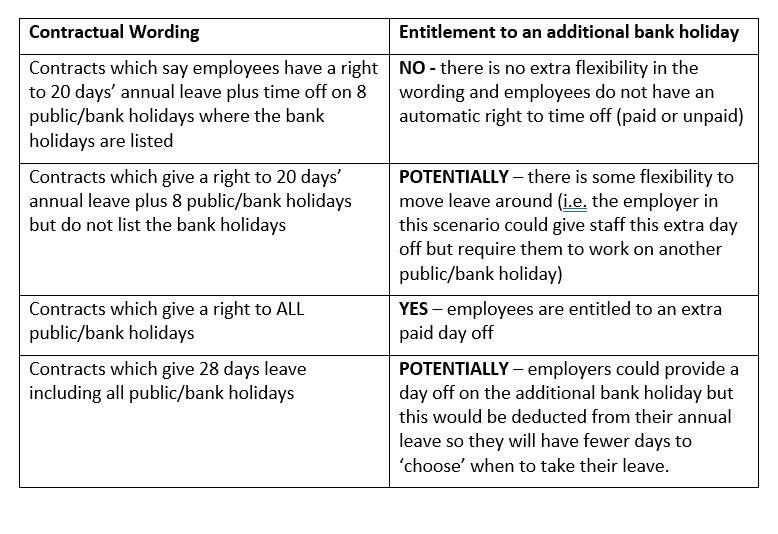An employers guide to additional bank holidays
Helping employers think about the legal requirements and the best approach for their business.

The government announced that Monday 19 September 2022 will be a national bank holiday in all parts of the UK for Her Majesty Queen Elizabeth II’s State Funeral. This will also mark the last day of the period of national mourning following The Queen’s death on 8 September 2022.
This comes at a difficult time for employers trying to balance the books. Costs are increasingly challenging to manage and some are unsure how they’ll keep the lights on and keep people warm. Many employers have already paid for two additional bank holidays this year for employees as a result of the Platinum Jubilee celebrations.
Government guidance provides that this bank holiday CAN be treated the same as other bank holidays, but what does it really mean in practice? It is worth taking time to reflect as not only is there an additional holiday planned for the funeral, there is a possibility that there will be a further day for the coronation of His Majesty King Charles III.
Do I have to give employees time off work?
The working time directive simply outlines a legal right to 28 days holiday a year (for full time staff). There is no statutory right to time off for additional bank holidays. Employers need to carefully review their contracts of employment to determine whether their staff are entitled to time off on this additional bank holiday. To help you think through this challenge, we’ve outlined some frequently used clauses that appear in contracts and what they mean in practice.

You should check your contracts carefully for any other flexibility in the wording such as “8 public/bank holidays as listed, or other days as determined by us”, which may allow the employer to give staff the extra day off but require them to work on another public/bank holiday.
Even if I’m not legally required to provide a paid day off should I consider it?
If you are not legally bound by your contracts, you may still decide to give your employees a paid day off at your discretion. Our experience is that the majority of employees seem to expect to receive the paid day off or another day in lieu. Given additional bank holidays are rare, it is not a surprise that most employers have tended to honour them. It’s important to consider the potential intangible and hidden costs if you don’t provide the additional bank holiday. It is likely to have a detrimental impact on employee morale and commitment – which in turn is detrimental to productivity.
How do I manage part time staff?
Legally you must ensure that your part time employees are not treated any less favourably than full time employees. In practice this means that you must pro rate bank holiday entitlement for part time employees. Most bank holidays fall on a Monday or Friday; if an employee doesn’t work these days they will loose out if you do not pro-rate their allowance.
We will be open on the bank holiday and we need our staff to work, what happens now?
You can treat the day like any normal working day. It’s likely your employees will be used to working bank holidays if you stay open. In this scenario you should highlight that an employee should put a holiday request in if they wish to take time off. It’s important to handle holiday requests fairly, consistently and in line with employment law. You should ensure that any rotas and holiday approvals do not favour a particular group of employees. Employers often operate a first come basis to avoid detrimental treatment. You can also state how far in advance holiday requests are received to ensure you can plan rotas and cover.
If staff are asked to work, you may want to consider time off in lieu or paying a supplement. There are no statutory rules and this is entirely based on your contracts and custom and practice. If these is nothing written you can make the decision at your discretion.
We can’t afford the additional day, can we mitigate the impact on employees?
The most important thing is to be honest and upfront with employees. Make them part of the solution. Share with them the business situation, the current cost challenges and the impact on the bottom line. Visibility of budgeting challenges may help employees to feel less resentful and more committed to helping you get through challenging times. Individuals often forget the reality of the cost of holiday so turning it into numbers may help them to understand the situation. And you may be surprised by the creativity and solutions offered by employees if you share the problem.
Whatever you decide to do, clear communication is critical to ensure this issue is managed effectively and doesn’t have a detrimental impact on morale. You need to clearly outline expectations in good timescales.
If you would like help with this issue or any other people related matters do get in touch.










